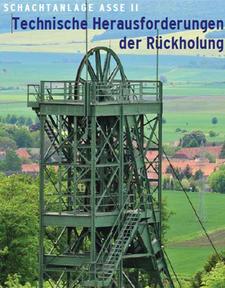Technical challenges of retrieval: BfS invites to expert meeting
The deadline for registrations is 31 January 2014
end 2014.02.13
The expert meeting takes place on 13 February 2014 at Lindenhalle in Wolfenbüttel. Key issues to be dealt with are questions around the technical options to recover the radioactive waste. Furthermore, the BfS seeks an open, professional dialogue with external experts on challenges to the retrieval project on the grounds of rock mechanics and inflow of water.
Subject “Waste and conditioning”
About 126 thousand drums containing low-level and intermediate-level radioactive waste are stored in the Asse mine. What state the containers are in can as yet only be presumed. The inventory of the radio-toxic content being insufficient by today’s standards, these gaps in knowledge will also pose a challenge to the experts. State and content of the waste packages are key to the safe packaging and future disposal in a safe repository. Experts from the nuclear industry, authorities and research institutions will exchange opinions as to what experiences have been made until today in conditioning and what needs to be taken into account especially in the packaging the waste and conditioning it in a manner that is suitable for disposal.
Subject “Recovery method”
Radiation protection officials recommend that the radioactive waste be recovered with the help of robots and remote-controlled machines, where possible. This way the radiation exposure to the staff can be kept as low as possible. The retrieval project being unique in the world, there is only limited experience in this area. A lecture will explain the special requirements for the recovery method. It is also expected that experiences with remote-controlled technology in the nuclear industry will be exchanged and how this technology can be used in mines.
Subject “Fact-finding and planning of retrieval”
The Asse GmbH has successfully completed two drillings in and at chamber 7. In the process of these drillings, the engineers have as yet detected neither explosive gases nor significant contamination of the surrounding rock. The head of the “Fact-finding” project will give a lecture of the findings and experiences gained so far. They are vital for future works and the overall planning of retrieval. Also on this topic an expert will present first sketches and bring them up for discussion.
Subject “Brine inflow and rock mechanics”
Twelve thousand litres of salt water per day flow into the mine. Measurements show changes in the inflowing volume. There are also places of brine inflow that used to be dry over long periods of time, where solutions are again collected now. Despite of considerable countermeasures taken, geologists cannot rule out the worst case i.e. that the mine will drown before the waste can be retrieved. Numerous mine areas have been remediated and stabilised in the past months in order to limit rock movements and places where solutions can flow into the mine resulting from these rock movements. Regarding this issue the lectures will deal with geological options of predictability and exploration.
Address
38300 Wolfenbüttel
Germany


